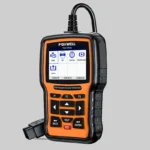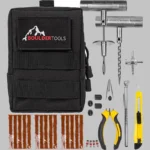Gone are the days when a good wrench and a keen ear were all you needed to keep engines purring smoothly. Today’s cars are complex beasts, brimming with sophisticated electronics and systems that require an equally advanced set of tools to diagnose and maintain.
In this guide, we’ll walk through the essential diagnostic tools that every mechanic—amateur or professional—should have in their arsenal.
Essential Diagnostic Tools

1. Scan Tool
The cornerstone of any modern mechanic’s toolkit is the scan tool. This device is not just for pulling up error codes; it’s a window into the inner workings of a vehicle’s brain. A high-quality scan tool can provide real-time data, monitor engine performance, and even reprogram vehicle systems—a near magical capability that was the stuff of mechanics’ dreams just a decade ago. If you’re serious about automotive repair, investing in a versatile scan tool is a no-brainer.
2. Code Reader
While a scan tool sounds like the Swiss army knife of diagnostics, don’t overlook the humble code reader. These devices are simpler, designed for quick checks of the engine light without the bells and whistles of their more sophisticated cousins. For many DIYers and professionals alike, a reliable code reader is a first line of defense, offering a quick snapshot of a car’s health.
3. Power Probe
If the scan tool is the brain, the power probe is the nerve ending. Essential for electrical diagnostics, a power probe can instantly tell you about the voltage, ground, and continuity without fumbling with multiple tools. It’s like having a superpower, where you can see the invisible electric life flowing through the car’s veins, ensuring all is as it should be—or diagnosing it quickly if not.
4. Multimeter
Think of a multimeter as the detective’s magnifying glass for any electronics job. Whether you’re checking for battery drain, testing outputs, or troubleshooting sensors, a good multimeter can be your go-to tool for precise measurements. It’s crucial not just for automotive tasks but for almost any electrical repair around the shop.
5. Battery Tester
A car won’t go far with a dead battery, and sometimes, the problem is deeper than the battery itself. That’s where a battery tester comes in handy. It not only tests the charge but also evaluates the battery’s overall health, checking for potential issues that could leave your customers stranded. Consider it an essential health check-up tool for any vehicle coming into your shop.
6. Compression Tester
Last but definitely not least, the compression tester. This tool is vital for assessing the health of a vehicle’s engine. Low compression can point to a variety of woes—worn-out piston rings, leaking valves, or head gasket failures. A compression test can be a clear indicator of such critical issues, guiding a mechanic on whether a deeper engine overhaul is necessary.
7. Digital Inspection Camera
Imagine being a detective in a tight spot—literally. That’s when the digital inspection camera comes into play. This tool is a boon for peering into those nooks and crannies of car engines and chassis where the human eye can’t reach. Its flexible neck and LED lighting illuminate dark crevices, making it invaluable for spotting elusive leaks or worn parts without the need for full disassembly. It’s like having X-ray vision, only more practical.
8. Bluetooth Diagnostic Tools
Welcome to diagnostics in the digital age, where Bluetooth technology meets vehicular troubleshooting. These tools connect wirelessly to a smartphone or tablet, allowing mechanics to roam around the workshop while still monitoring diagnostic data in real-time. Perfect for the multitasker who likes to stay on the move, these gadgets offer freedom without losing connection to the task at hand.
9. Specialty Testers
Some jobs require a specific touch, and that’s where specialty testers come in. Need to pinpoint a tricky oil leak or diagnose a finicky transmission? There’s a tester for that. Tools like leak detectors and engine analyzers can save hours of guesswork, providing precise data that can help pinpoint issues quickly. These tools don’t just add to your toolbox; they open up new possibilities in automotive diagnostics.
Equipping your garage with these diagnostic tools isn’t just about stocking up—it’s about preparing for every challenge a vehicle might throw your way. With this arsenal, you can face the most daunting issues with confidence, backed by technology that makes your job easier and more efficient.

Matthew Dowell
Matthew, a seasoned builder from a family of craftsmen, leads Tools Trove. His passion for tools and decades of hands-on experience fuel his commitment to providing expert reviews and insightful content. Whether you’re a pro or a DIY enthusiast, Matthew’s guidance ensures informed decisions in the world of tools.




